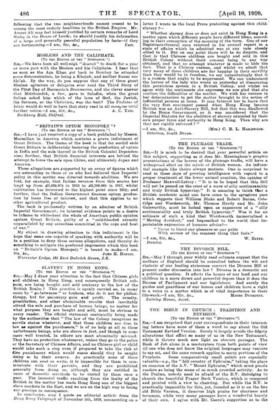SLAVERY IN HONG KONG.
[To THE EDITOR OF ze " SPECTATOR.") Sni,—May I draw your attention to the fact that Chinese girls and children in Hong Kong, and consequently British sub- jects, are being bought and sold contrary to the law of the British Realm P This practice is openly carried on, in many oases by " go-betweens " or brokers, who do it not for philan- thropy, but for pecuniary gain and profit. The cruelty, prostitution, and other abominable results that inevitably attend the sale and purchase of human beings, no matter for what purpose they are bought and sold, must be obvious to every reader. The official statement continually being made by the authorities that " The law of the Colony recognizes no -servile statue whatever, and that these children are free in law as against the purchasers," is of no help at all to these unfortunate beings, who are slaves in fact, and though in some cases well treated, in others are most abominally misused. They have no protection whatsoever, unless they go to the police or the Secretary of Chinese Affairs, and no Chinese girl or child would take such a step even if prepared to take the risk of dire punishment which would ensue should they be caught doing so by their owners. As practically none of these children can read or write, it is impossible for them to com- municate with their parents, and they are prohibited generally from doing so, although they are entitled in cases of domestic servitude to be visited by them once a year. The immoral traffic resulting from the laxity of the British in the matter has made Hong Kong one of the biggest slave markets in the East, and we are on the high way to losing our prestige in consequence.
In conclusion, may I quote an editorial article from the Hong Kong Telegraph of November 5th, 1919, commenting on a letter I wrote to the local Press protesting against this child- slavery P- " Whether slavery does or does not exist in Hong Kong is a matter upon which different people have different ideas, accord- ing to their conception of the meaning of the term. One of our Registrars-General once referred in his annual report to a state of affairs which he admitted was at any rate °lose* allied to it. But on one point there will be no dispute, and that is that Chinese children are bought and sold in this British Colony without their consent being in any way obtained, and that no attempt whatever is made to hide the fact: That is a Chinese custom, and whilst we admit that very many of these children are far happier in their servility than they would be in freedom, we say unhesitatingly that it is a custom that ought to be suppressed. We can understand the horror of the lady who wrote us yesterday at discovering this pernicious system in a British Colony, and whilst we agree with the sentiments she expresses we are glad that she realizes the difficulties of the matter. We wish her success in her determination to get the matter brought to the notice of influential persons at home. It may interest her to learn that the very first enactment passed when Hong Kong became British was an Anti-Slavery Bill, but that this was disallowed by the Home Government, as it was considered that the Imperial Statutes for the abolition of slavery extended by their own proper force and authority to Bong Kong. Then why are they not rigidly enforced ? "
Ottertail, South Devon.


































 Previous page
Previous page